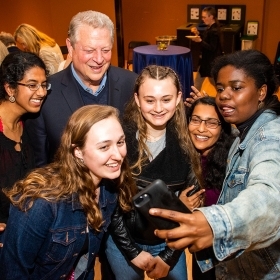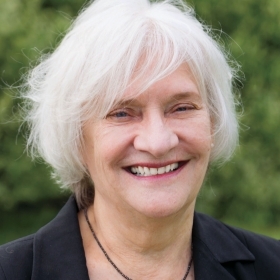Photo by Richard Howard
Beth DeSombre, Camilla Chandler Frost Professor of Environmental Studies and director of the Wellesley environmental studies program, is a political scientist whose work intersects with the real world every day. For Wellesley students, DeSombre’s course Social Causes and Consequences of Environmental Problems, is both academically challenging and personally eye-opening. It’s known informally as “why good people do bad environmental things.”
“I was tasked with creating the course when we redesigned the environmental studies major a decade ago,” says DeSombre. “We said, what we really need is a course about what social science tells us about why we get environmental problems, and also what it tells us about how we fix them.”
Now, with the publication in April of her book Why Good People Do Bad Environmental Things by Oxford University Press, people far beyond Wellesley can share that knowledge.
“This is a book that’s a deep dive into what academic studies have found in different fields,” DeSombre says. “In a scholarly sense, it’s doing something that hasn’t been done—but it’s very much aimed at a broader audience.”
In the book, DeSombre considers research from political science, sociology, psychology, and economics to understand the forces that drive bad environmental behavior. There’s little evidence that having more information about environmental problems or the way an individual’s actions contribute to them actually changes behavior. Such knowledge may even backfire, as people come to see themselves as powerless to address huge global problems. But if we can figure out why those problems are caused, she argues, we can develop strategies to shift behavior in a positive direction.
Reaching this goal means stepping out of the siloed intellectual spaces typical of higher education. The environmental studies program encourages such interdisciplinary thinking.
“I think of environmental studies as the perfect liberal arts college major, because the whole idea of addressing environmental issues is that you can’t do it from any one discipline,” she says. “I can say, here’s how all the social science intersects. If we don’t connect that knowledge and that action, we’re not going to get anywhere. You can do all your lab experiments and be as certain as you want to be about what causes something environmentally, but if you can’t figure out the incentive structures that are causing people to do this, or the political process that’s going to create a change, knowing everything there is to know scientifically about the issue isn’t going to get you anywhere. You have to be really interdisciplinary to successfully address environmental issues.”







We ask that those who engage in Wellesley magazine's online community act with honesty, integrity, and respect. (Remember the honor code, alums?) We reserve the right to remove comments by impersonators or comments that are not civil and relevant to the subject at hand. By posting here, you are permitting Wellesley magazine to edit and republish your comment in all media. Please remember that all posts are public.